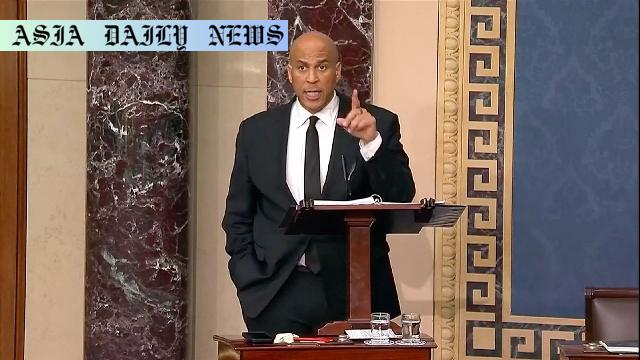Senate Speech: A record 25-hour address criticizing Trump’s policies and the potential impacts on healthcare and governance.

Cory Booker’s Record-Breaking Senate Speech: A Historic Moment of Defiance
In a breathtaking display of endurance and determination, U.S. Senator Cory Booker from New Jersey took the Senate floor for 25 hours and 4 minutes, breaking the previous record set in 1957. His speech was a protest against what he described as the harmful policies of the Trump administration. Beginning at 7 p.m. on Monday, Booker remained resolute, standing without pause—even foregoing basic necessities. This physical and mental feat underscored the gravity of his message and drew nationwide attention.
Booker’s primary focus was on the policies of President Donald Trump and criticisms directed at Elon Musk, head of the Department of Government Efficiency (DOGE). The senator argued against Musk’s plans to drastically downsize the government, warning that such measures could destabilize essential public services. His message was clear: “I believe sincerely that our country is in crisis.” This emotional appeal formed the crux of his argument, emphasizing systemic failures that could impact millions of Americans.
Healthcare and Governance: Central to Booker’s Address
The young senator also expanded on the potential dangers to the nation’s healthcare system under the Trump administration. He argued that proposed changes could exacerbate inequalities, leaving vulnerable populations at risk. His speech delved into specifics, highlighting the importance of Medicaid, Medicare, and the Affordable Care Act. Booker accused the administration of moral negligence, calling this moment in history a “moral moment” that transcended partisan politics.
Booker’s choice to stand for over a day was not merely about theatrics; it symbolized unwavering resistance. “This is not about left or right—it is about right or wrong,” he declared. His ability to blend statistical evidence with impassioned oratory left a lasting impression on both advocates and detractors alike. With applause echoing through the chamber as he concluded his speech, Booker successfully positioned himself as a leading voice in the Democratic Party and a potential defender of progressive causes.
The Historic Impact and Public Response
The marathon speech drew immense public and media attention, generating discussions on social and traditional platforms. Major outlets were quick to report this achievement, contextualizing it with the tense political climate. The speech also sparked dialogues about the efficacy of such protests and their role in contemporary democracy.
Many commentators praised Booker for his stamina, both physical and rhetorical. His ability to hold attention for over a day, punctuating his speech with compelling arguments and calls to action, demonstrated the power of the filibuster as a tool for advocacy. However, he also faced criticism from opponents who questioned the practicality and impact of such a protest. Nevertheless, few could deny that this act etched Booker’s name in the annals of Senate history.
Commentary
The Role of Protest in Politics
Senator Cory Booker’s 25-hour marathon speech is a powerful reminder of the importance of dissent in democratic systems. When lawmakers feel that the voice of the people is being overshadowed by administrative decisions, such courageous acts of defiance become more than just symbolic—they provide a platform for slow, yet impactful change. Booker’s stand was not about instant victories, but about sparking a dialogue that could resonate beyond Senate chambers and into the American consciousness.
The Physical and Emotional Toll of Advocacy
What makes Booker’s act particularly commendable is the sheer physical toll it must have taken. Standing for over 25 hours without a break requires both extraordinary determination and a deep-seated belief in the cause he was fighting for. It is a testament to his passion for the nation’s issues, especially the vulnerable populations who could potentially suffer under harmful policies. By making this sacrifice on the Senate floor, Booker underscored the need for political leaders to go beyond their comfort zones for the greater good.
A Legacy of Leadership
This event serves as an inflection point in Booker’s career. Known for his charismatic leadership and dedication to progressive ideals, this bold protest has elevated his stature nationally. It speaks to the potential for individuals in politics to redefine narratives and put the spotlight on issues that truly matter. For many Americans, Booker’s speech was a moment of hope—a signal that moral courage still exists within political institutions. Ultimately, his legacy from this speech isn’t just the hours he clocked, but the values he championed.


